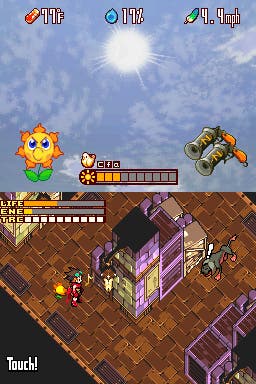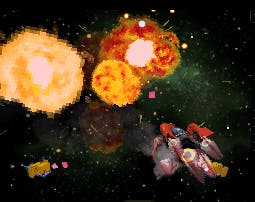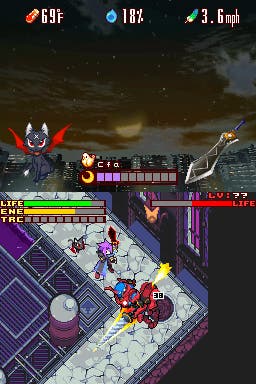Lunar Knights
Good night, sunshine?
I am constantly amazed. Not by anything special, you understand, but by those normal things in life that can easily be explained away by anyone with a rudimentary knowledge of science. Like the way it's possible to stand up inside a train and walk safely forwards while the outside moves at a high velocity. Witchcraft, if you ask me. Or how a television can effortlessly pulls together a signal in order to create a perfect representation of a human being. You're telling me it's been sent through the air like that? Get away! And eggs - don't even get me started.
It's exactly this kind of caveman in the future thinking that found me noticeably impressed when playing the average 3D racing game that came installed with my new mobile phone the other day. Here were visuals which barely merited a gasp, even back in the pre-graphics card era of the '90s - blocky, angular, low-res - and here's me being wowed purely because they've managed to work this feat of computational power onto a screen the size of a teabag. Clearly, it is The Future.
Such is the case for Lunar Knights. I've seen full-motion video and I've heard speech on a handheld, and I've experienced both countless times on its plug-bearing console brethren, but somehow I regress into an easily-pleased simpleton when I view the handful of cut-scenes with their full-colour animation and corresponding vocals that pepper the game. Alright, they may be about fifteen seconds long, and a bit grainy, to be sure, but, man, those production values are high.

Of course, that extra mile is probably what we would expect of a game hailing from the studio responsible for the epic Metal Gear Solid series. Knights is its less heavy-handed (no meta-narrative here, folks) side-project, sequel to the GBA's first two vampire-hunting Boktai games. And if the impressive technical gimmick of the last paragraph has been successfully integrated into the latest in the series, another has been taken away. The solar sensor was an innovative gaming peripheral built into Boktai's cart. When playing the game in sunlight, it absorbed the sun's rays and translated its strength in-game into the energy that powered your weapons. Everything relied on your access to natural light; play in the dark and you were pretty much stuffed. That's gone now, though, replaced by a bog-standard automatically accelerated day/night cycle. Presumably, this was because sitting out in the sun all day wasn't something that dedicated handheld owners were prepared to do - especially not something conducive to the bi-polar weather we get on this miserable rain-soaked isle, (although owners of those previous games can, if they want, bring it all back by plugging the old game into the GBA slot at the same time).
In light [Fired! - Ed] of those circumstances, things are slightly different. With restrictions lifted on when you can personally play, you instead control two different characters who each have their own restrictions based on the in-game clock. One is a sword-wielding, angry lad of the night, the other is a fresh-faced gun-slinging day-walker. Their world is in peril, overrun by vampires who've invested in a sun and weather controlling device - quaintly known as the ParaSOL - to aid in their dominion. For revenge, justice and contrived gaming plots, the story sees the two of them grudgingly team up to take on the forces responsible and rid the world of those darned neck-biters.
How this translates into gaming terms in this isometric action adventure is the ability to switch between either character at the press of a Select button. Their light and dark personalities come into play because each is more powerful underneath either the sun or the moon respectively. Weapons deal more damage and energy levels are replenished more easily if the right person is used at the right time. As well as this aspect, you're also accompanied by a selection of terrenials, elemental sidekicks who bless your armoury with the usual powers of fire, ice, etc. Each monster has a different property, and attacking it with its opposite means greater damage, requiring you to switch between each element and team-mate as and when in order to improve your chances.
Night Lite

If that's not adding another egg to the combat pudding, then the RPG-style system certainly is. The more you kill, the more experience points you get, allowing you the opportunity steadily up your stats. Similarly, weapons can also be upgraded through items dropped by enemies or material bought in shops, giving you a dramatic upper hand in the midst of all the anime vampire slaying. While levelling-up is a nice idea, in theory - appropriated from the likes of the latter Castlevanias - it is, however, less an essential dynamic and more like an extra layer of superfluous complexity added to what is an enjoyable but slightly plain slash 'n shoot adventure.
It's disappointing to realise that this system is a surrogate to the puzzles that could have been included: in short, beyond the fighting, there's really nothing that takes advantage of your environment in a clever way. There are no Zelda-style abilities to add to your arsenal, and little in the way of even switch puzzles (amazing what you miss when it's gone), or anything that really makes full use of the differences between the two leads beyond one or two sections. There are elemental blocks barring secret rooms in each dungeon, which can only be destroyed when you achieve the right terennial, but come on, that's not very exciting. Neither is changing the climate: you can make it rain to reach ledges with climbable vegetation, or dry out pools to create paths, for instance. However, the fact that you have to do this via the central map, requiring you to restart from the beginning of a large, respawning dungeon to find out if it worked makes it more of a frustrating waste of time than a fun treasure hunt.
Combat is fine if a little iffy. While your offensive capabilities are nice to use - targeting while holding down the R button is a boon - trying to block blows with your shield isn't so much as there can be a slight delay between attack and pressing the button that brings it up, leaving you reeling from a sneaky hit despite your actual responses being on the nose. It may be intentional, but it's still annoying. And again, despite having different weapons, you're still fighting the same monsters with each character, the only real difference being whether you fight them close-up or further away.
This being a Kojima game, it also gives you the ability to do a bit of sneaking, too. To aid this, you can blow into the microphone and your character will whistle for you, distracting enemies from their posts to investigate. It's a nice use of the handheld's abilities, just a shame that it's so underused and mostly unnecessary outside of the times the game places a limit on you for the few short missions in which you mustn't be spotted.
Day Release

Well, that's the negatives out of the way. Chief positive here is the aforementioned presentation which adds an attractive gloss to proceedings lacking from a lot of similar handheld efforts. Lunar Knights bears a big-eyed anime style of visuals where even the rotting zombies you encounter look cute enough to hug, and the scenery is bright and crisp despite this being a pitch-black story at heart. Audio is well-orchestrated and dramatic, and the snippets of sampled speech a welcome inclusion. In game terms, levels can be revisited at any time to grind up stats and explore further and talking to NPCS on the world map will sometimes reveal bonus missions to gain items and experience. And despite bemoaning the RPG mechanic earlier, it does provide a certain degree of satisfaction in progress made as you level up your duo.
The best thing, though, is the shoot 'em up mini-game. Each time you defeat a boss, you're tasked with jumping in a spaceship and blasting out of the atmosphere to purify him in the uninhibited glow of the sun's rays. To do this you fight through waves of attackers: as your ship moves into the screen, you dodge bullets and asteroids by dragging it with the stylus, and blast enemies by quickly tapping them into oblivion. It might not quite stand up on its own, but as part of the overall package, it's a welcome addition to the ideas packed into the cart.
Lunar Knights is a plain idea wrapped in an ornate cloak; peek underneath and its fleshy action adventure innards look a little bony. Crucially, without the sunlight gimmick it's lost the ability to truly stand out from the crowd. Making it more accessible has made it a little less unique, sadly. Nevertheless, it'll keep you entertained if all you require is a story-based action game that gives out as much as you're willing to put in. Unless, like me, you get distracted at how those bumps in a record translate into actual sounds. I'm telling you, it's not natural.
